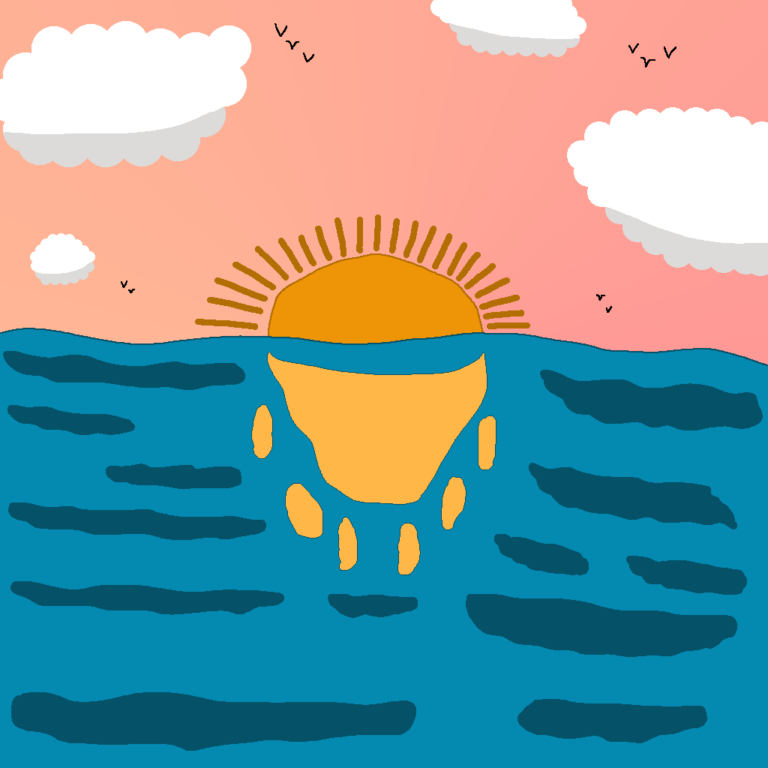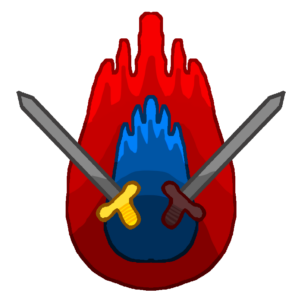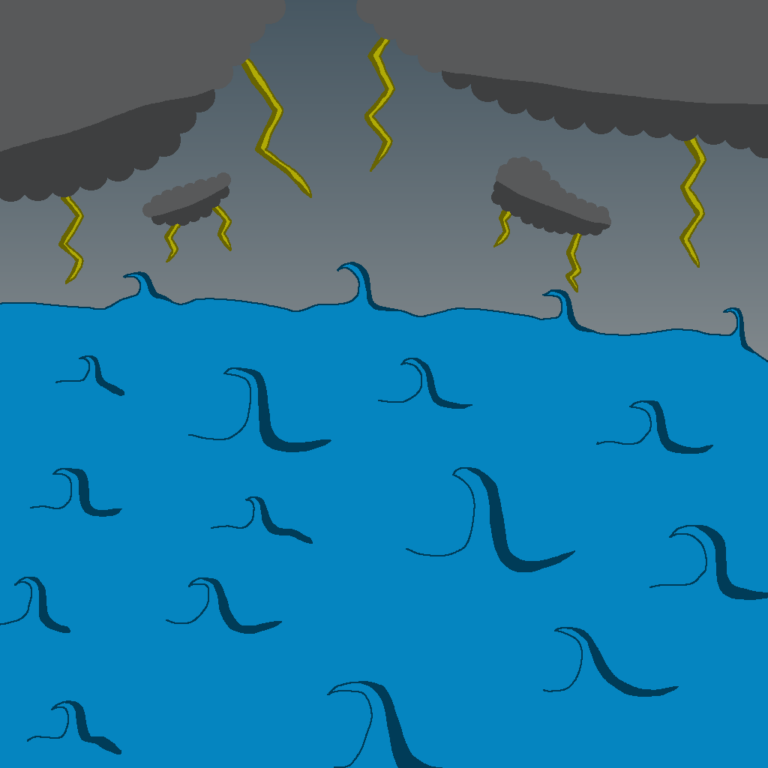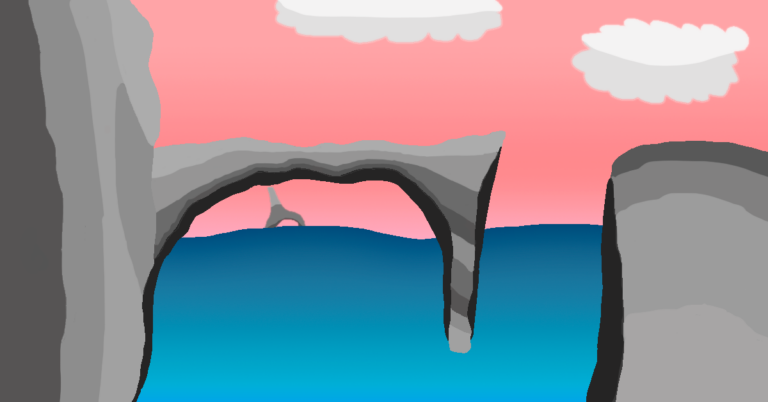Join US
Do you want to build the fantasy world you’ve always dreamed of?
Subscribe to receive notifications when a new post is out and for our monthly newsletter!
You can always unsubscribe anytime.


Following the river all the way down to its end, the man sighed as he looked at the great watery expanse in front of him. Water to the left, water right in front of him, and water to the right! He had never seen so much water in his life and here he was, witnessing the spectacle of the ocean for the first time. Seeing it made him realize just how small he was in the world. A great noise from far drew his attention and he saw a whale jumping out. He smiled, perceiving that whales were one of many creatures who dwelled in a fantasy ocean.
A fantasy environment, the ocean is the largest when it comes to size. No other environment comes even close. It’s where all water from rivers and streams flow into. The ocean teems with strange, otherworldly beasts and plants rarely seen.
The fantasy ocean plays a pivotal role in worldbuilding. It’s where ships transport people and goods from one landmass to another. Under the waves, it’s an entirely new world down there, full of fish and vibrant plants. In some worlds, there’s even civilizations underwater!
Its sheer size makes traveling take weeks to months to make it across, depending on the mode of transportation used. The vast majority of fantasy worlds haven’t reached the point to where air travel is possible, at least on a large scale. Those that do, planes and other airborne vessels don’t take long to fly across an ocean.
Due to how little’s known about it, the ocean is among the most mysterious place in the world and exploring it comes with its own set of challenges. The mysteries of the watery depths range from elusive creatures that slumber on the seafloor to remnants of wrecked ships and grand underwater cities that’s escaped notice for thousands of years!
A fantasy ocean’s storyline potential depends on the type of story being told. In many plots, it shows up in the backdrop, appearing when characters are sailing, usually on a mission to find something or someone. Others put it as a significant character who has the power to make life easy or difficult for everyone who sails on them. Others devote the full plot to it, typically focusing on the civilizations found down there. The ocean offers a lot of possibilities!
This is the sixth in a series examining the various environments in fantasy. If you haven’t read any of the first five, here they are:
Alternatively, you can check out our blog page and look through what we have!
Let us don on a water suit and jump into it to see what it’s all about!
A world typically has more than one fantasy ocean. The combined size of all oceans means they take up over half of the planet’s surface. It also extends many miles deep. The deeper you go, the less light there is. It’s pitch-black in the deepest part of the ocean. All the water from rivers and other channels make their way to the ocean. That water is then recycled and picked up from the storms that pass by overhead to rain upon the land.
Oceans appear in many climates. Many people associate them with the tropics, since many tropical islands are surrounded by oceans though they can be found in cold places. Their location in the world dictates what life will be found there. Warm climes have fish and other aquatic species that flourish in such places. The cold parts have seals and penguins.
Their vastness separates continents and islands, making travel between them difficult and time-consuming. Many fantasy worlds haven’t advanced technologically to the point where air travel is possible. Instead, worlds like Hyrule and Skyrim must use naval vessels to navigate the seas.
Traversing the seas takes weeks, if not months, and is usually fraught with danger. Seaborne vessels must worry about pirates, gigantic creatures like the legendary kraken, or savage storms like hurricanes. In order to get people and goods from one landmass to another, it’s required to sail the seas. Period.

A fantasy ocean behave differently depending on where the boat is traveling and the time of year it’s traveled. In some places, the water is calm and easy to traverse in summer. In other places, the waves are violent and likely to make a ship capsize in late fall.
The ocean changes everyday. One day, she might be calm and collected. The next, she might be full of fury, seeking as much carnage as possible.
A fantasy ocean harbor many secrets because of its great size. Since there’s little knowledge about it, people love exchanging stories about it. The wilder the story is, the better it is! They also love hearing sailors talk about the fearsome monsters they battled in the sea.
Legendary creatures such as water dragons and the kraken lurk in the depths, waiting for their opportunity to strike. And when they strike, they leave few to no survivors, leaving only the wreckage of the ship in their wake.
The ocean is home to many unusual denizens such as mermaids and sea serpents. These creatures exist only in fantasy and they seldom show themselves to outsiders. As such, not many people know about them and those that do view them with fear.
Ships that mysteriously broke apart while sailing the high seas wind up on the seafloor, dooming everyone who was aboard when tragedy struck. The seafloor is littered with the pieces of the downed ships scattered all over. How and why these ships fell apart becomes a secret that only the ocean knows.
Another secret a fantasy ocean conceals is that of the underwater civilization. Unknown to those on land, a group of people, whether it be a humanoid or an aquatic species, established powerful kingdoms under the waves. They built great cities and domesticated many sea creatures. These civilizations were aware of the going-ons up on the surface and made no effort to contact them, preferring to remain hidden. They venerated their deities, who wielded the power of water.
Some aquatic civilizations have a temple nestled deep within the ocean. The temple honors their patron deity and is where they worship. It also serves as a gathering place to mark special events like weddings and funerals. The temple is known only to the citizens of the deep; nobody on the surface even knows about it.
The role a fantasy ocean plays in the story depends on what kind of plot it is. It’s broken into three different groups: the surface, the ocean as a central character, and the underwater world. The ocean is unique among many environments in that its versatility gives it an opportunity to shine regardless of what story is being told.
The other environments only appear in certain parts of the story and they play specific roles. Here, the fantasy ocean enjoys an unrivaled amount of freedom since it’s easy to adapt it to the story instead of the other way around.
The first group looks at the surface. Plots that take place entirely on the surface such as two warring factions clashing for supremacy don’t use the ocean very much. Instead, it’s used as a visual prop, a scenic background for the audience to enjoy as one or more characters sail from one landmass to another.

Additionally, the ocean is also where two characters converse about where they’re going and why. The audience enjoys watching the characters talk with the majesty of the ocean in the background. This group is the most used, appearing in the great majority of stories set in worlds like Middle-Earth and Skyrim.
Next up, the ocean as a central character. Here, it acts much like an actual character, having emotions and feelings despite not having a physical body. The characters in these stories speak of the ocean as someone they know quite well. The ocean shows what it’s feeling. Calm waters with a bright sky means it’s content and at peace. Gale winds and tidal waves amidst a storm signifies that it’s angry. Tales that take place fully at sea like Pirates of the Caribbean have the ocean as a central character.
The last group takes place under the waves. The ocean is the stage where the story takes place. From the beginning to the end, the audience is immersed in a world that exists solely underwater. They see fish-shaped characters and almost otherworldly architecture. Each character has their own personality and way of speaking. Stories like this typically don’t have the underwater world interact with the one above the waves.
The fantasy ocean is an invaluable part of worldbuilding. It takes up so much space on the world that ships take a long time sailing from one place to another. Yet it also serves as a way for people from separate continents to communicate and get to know each other. It’s also rich in life, from the mighty shark to the shrimp.
Its sheer size means there’s still much to learn about it. From the fearsome creatures that slumber at the bottom to the remnants of wrecked ships, there’s no shortage of secrets the ocean has. Unraveling its many secrets require people of incredible courage, for it won’t give them up that easily.
Bringing the fantasy ocean to your world is easy! After creating the map of your world, the space in-between landmasses will be your oceans. All you have to do is come up with creative, cool names for them.
An ocean is boring if it’s devoid of life. Put however many fish and plants you want to make it a dynamic, vibrant place. This includes legendary mythical creatures like the kraken as well.
The ocean works seamlessly in all kinds of worlds, regardless of what story you want to tell. You just need to adapt it to match your story and it’ll work beautifully!
Let me know what you think in the comments below. (Note: this is an account-exclusive feature).
If you don’t have one, you can register here. It only takes a few moments of your time!
Liked this article and want to subscribe? All you have to do is fill out the form below and that’s it!
Thanks for reading this and until the next time,
Sunfire
Subscribing means you receive:
You can always unsubscribe anytime.
Do you want to build the fantasy world you’ve always dreamed of?
Subscribe to receive notifications when a new post is out and for our monthly newsletter!
You can always unsubscribe anytime.